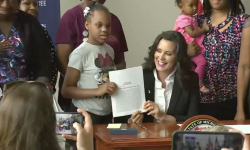No deal: Senate GOP rejects possible budget compromise

Update: Michigan budget breakthrough in works as Gretchen Whitmer, GOP near deal
LANSING — County sheriffs, small schools, local governments and other groups grappling with state funding cuts will have to wait several more days — or possibly weeks — for Michigan leaders to try and resolve an ongoing budget dispute.
Senate Majority Leader Mike Shirkey, R-Clarklake, on Thursday rejected a potential budget deal negotiated between Democratic Gov. Gretchen Whitmer and House Speaker Lee Chatfield, R-Levering.
The House did not act on any supplemental spending bills but announced plans to meet again on Wednesday, delaying the start of a fall break that coincides with firearm deer hunting season and Thanksgiving. Without a breakthrough next week, Lansing’s process fight will likely continue through the end of the month.
The proposed deal would have reversed many of the $947 million in line-item vetoes Whitmer issued last month in an attempt to force continued talks with the Republican-led Legislature.
New budget language would have limited the governor’s power to transfer funds within departments using the Administrative Board, a rare maneuver Whitmer utilized to redirect $625 million from the $59.9 billion spending plan Republicans approved in September.
Shirkey, who has called the transfers a concerning separation of powers issue, continues to insist that limits on the governor’s power be codified in state law via separate legislation.
“Senator Shirkey and the Republican caucus agree with all components of the deal that was put forward but for the fact that it didn’t include the weight of law,” spokeswoman Amber McCann told reporters after the Senate adjourned without action.
Hopes for a budget deal appeared high Thursday morning, when Whitmer told reporters she thought the administration and Legislature were “close” to finalizing an agreement she had discussed Wednesday with Chatfield.
“We have really made great ground on a supplemental, and if the Legislature wants to get that done and to my desk, it can be just a matter of hours at this point,” the governor said. “So the question is, are there going to be some political games still being played? I hope not.”
The budget feud began in September roughly three weeks before the constitutional deadline to complete a state spending plan for the new fiscal year in order to avoid a partial government shutdown.
The Republican-led Legislature ended up finalizing a budget without the administration’s input, itself a rare move. Whitmer responded with an unprecedented volume of line-item vetoes and transfers, some of which she has made clear she would reverse as part of a broader deal.
Whitmer effectively controls the Administrative Board and has refused to sign away any long-term powers for herself or future governors.
She has, however, publicly vowed she will not transfer any funds included in a negotiated budget. In a Monday letter, Lt. Gov. Garlin Gilchrist told lawmakers the governor would also be willing to sign — and honor — “boilerplate” budget language affirming that promise.
Those assurances weren’t enough for Shirkey earlier in the week, and without Whitmer agreeing to change state law, “we’re no closer” now, McCann said Thursday.
“There’s a list of people who are relying on the governor’s promises for this budget that are now sitting empty-handed,” MCann said, referencing the governor’s vetoes for programs she had publicly supported, including $1 million for an Autism Navigator program that connects parents with relevant resources. “The majority leader cannot rely upon the governor making a promise.”
As Bridge Magazine reported this week, the prolonged budget fight and Whitmer’s vetoes are forcing tough decisions for local governments, nonprofits and service entities that have already lost state funding — or will soon if state leaders do not resolve the dispute.
Chatfield, in a statement issued after the Senate adjourned, said “productive conversations” with the governor this week “laid the foundation for future discussions” but cited lingering concerns by multiple parties.
“Everyone wants to see funding restored for these important programs, and we all want to see a permanent resolution to this issue that maintains a constitutional balance of powers and provides real assurances that this situation won’t come around again,” he said. “We will continue to work together until we reach that point.”
The latest stalemate casts doubt on whether state leaders will resolve the budget dispute this year. The Senate is expected to meet Tuesday and Wednesday before beginning its own fall break. Beyond next week, each chamber is only expected to meet nine more times in December.
Thursday was “the best opportunity to fix the fundamental problems in the budget and protect public health and safety, which is why the governor and Speaker worked so hard to negotiate a bipartisan agreement on a supplemental and transfer power,” Whitmer spokeswoman Tiffany Brown said in a statement.
“With so many people’s lives impacted by this budget, it’s disappointing that the Senate Republicans are unwilling to compromise and chose to adjourn without finishing their work.”
State funding cuts have already prompted the Wayne County Sheriff’s Office to pull road patrol officers off the streets and forced small school districts to deny teacher supply requests. Upcoming payment deadlines the state is poised to miss threaten to impact public safety, health and local government programs across Michigan.
McCann, Shirkey’s spokeswoman, pinned blame on Whitmer: “The only person who cut their funding was the governor.”
But Senate Minority Leader Jim Ananich told reporters Democrats had been on board with the framework agreement Whitmer and Chatfield had discussed, leaving Senate Republicans as the lone hold out.
“I guess permanent changes to the Ad Board are more important that finding an equitable solution to the supplemental, so hopefully we will continue to negotiate,” he said. “I don’t know if we’re going to get there. I mean, maybe the budget is done, but it’s frustrating, and I feel like we should all put our egos aside and get to the business of solving problems.”
Chatfield first broached compromise Administrative Board language in a Wednesday meeting with the governor.
Shirkey leader “was aware” that Chatfield and Whitmer were going to meet, but he “was given the notice of the meeting relatively late, and he wasn’t able to participate,” McCann said. “He was not aware of the details” of Chatfield’s offer to the governor, she told reporters.
“The majority leader is always open to having a conversation with the governor, and I think his position is very clear to her,” McCann added. “I don’t think she’s confused about where he’s at, and it’s not going to change.”
See what new members are saying about why they donated to Bridge Michigan:
- “In order for this information to be accurate and unbiased it must be underwritten by its readers, not by special interests.” - Larry S.
- “Not many other media sources report on the topics Bridge does.” - Susan B.
- “Your journalism is outstanding and rare these days.” - Mark S.
If you want to ensure the future of nonpartisan, nonprofit Michigan journalism, please become a member today. You, too, will be asked why you donated and maybe we'll feature your quote next time!




